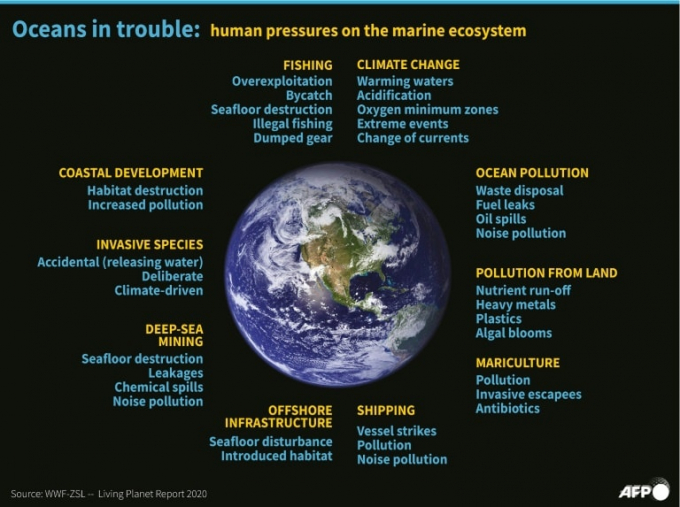November 28, 2025 | 06:00 GMT +7
November 28, 2025 | 06:00 GMT +7
Hotline: 0913.378.918
November 28, 2025 | 06:00 GMT +7
Hotline: 0913.378.918

Oceans in trouble. Photo: AFP/Emmanuelle Michel
"Today we face what I would call an ocean emergency," UN Secretary-General Antonio Guterres told thousands of policymakers, experts and advocates at the opening plenary, describing how seas have been hammered by climate change and pollution.
Humanity depends on healthy oceans.
They generate 50 per cent of the oxygen we breathe and provide essential protein and nutrients to billions of people every day.
Covering 70 per cent of Earth's surface, oceans have also softened the impact of climate change for life on land.
But at a terrible cost.
Absorbing around a quarter of CO2 pollution - even as emissions increased by half over the last 60 years - has turned seawater acidic, threatening aquatic food chains and the ocean's capacity to absorb carbon.
And soaking up more than 90 per cent of the excess heat from global warming has spawned massive marine heatwaves that are killing off precious coral reefs and expanding dead zones bereft of oxygen.
"We have only begun to understand the extent to which climate change is going to wreak havoc on ocean health," said Charlotte de Fontaubert, the World Bank's global lead for the blue economy.
Making things worse is an unending torrent of pollution, including a garbage truck's worth of plastic every minute, according to the United Nations Environment Programme (UNEP).
On current trends, yearly plastic waste will nearly triple to one billion tonnes by 2060, according to a recent report by the Organisation for Economic Cooperation and Development (OECD).
WILD FISH STOCKS
Microplastics - now found inside Arctic ice and fish in the ocean's deepest trenches - are estimated to kill more than a million seabirds and over 100,000 marine mammals each year.
Solutions on the table range from recycling to global caps on plastic production.
Global fisheries will also be in the spotlight during the five-day UN Ocean Conference, originally slated for April 2020 and jointly hosted by Portugal and Kenya.
"At least one-third of wild fish stocks are overfished and less than 10 per cent of the ocean is protected," Kathryn Matthews, chief scientist for US-based NGO Oceana, told AFP.
"Destructive and illegal fishing vessels operate with impunity in many coastal waters and on the high seas."
One culprit is nearly US$35 billion in subsidies. Baby steps taken last week by the World Trade Organization (WTO) to reduce handouts to the industry will hardly make a dent, experts said.
The conference will also see a push for a moratorium on deep-sea mining of rare metals needed for a boom in electric vehicle battery construction.
Scientists say poorly understood seabed ecosystems are fragile and could take decades or longer to heal once disrupted.
Another major focus will be "blue food", the new watchword for ensuring that marine harvests from all sources - wild caught and farmed - are sustainable and socially responsible.
PROTECTED AREAS
Aquaculture yields - from salmon and tuna to shellfish and algae - have grown by 3 per cent a year for decades and are on track to overtake wild marine harvests that peaked in the 1990s, with each producing roughly 100 million tonnes per year.
The Lisbon meeting will be attended by ministers and even a few heads of state, including French President Emmanuel Macron, but is not a formal negotiating session.
But participants will push for a strong oceans agenda at two critical summits later this year - the COP27 UN climate talks in November, hosted by Egypt, followed by the long-delayed COP15 UN biodiversity negotiations, recently moved from China to Montreal.
Oceans are already at the heart of a draft treaty tasked with halting what many scientists fear is the first "mass extinction" event in 65 million years. A cornerstone provision would designate 30 per cent of the planet's land and ocean as protected areas.
But preparatory negotiations in Nairobi ended on Sunday in deadlock.
"The agreement is at risk of collapsing on the question of finance," the environmental diplomacy lead for WWF France told AFP.
For climate change, the focus will be on carbon sequestration - boosting the ocean's capacity to soak up CO2, whether by enhancing natural sinks such as mangroves or through geoengineering schemes.
At the same time, scientists warn, a drastic reduction in greenhouse gases is needed to restore ocean health.
(AFP)

(VAN) A new study reveals how the simultaneous effects of ocean acidification, salinity and loss of oxygen are making the world more fragile.

(VAN) Hopes are growing that the creation of the first 3D turkey gut model could be a turning point in the battle against the virulent blackhead disease.

(VAN) Tyson, America’s biggest meat supplier, plans to shutter one of its largest beef processing plants as the industry continues to struggle with low cattle supplies and political pressure from Washington.

(VAN) New FAO study shows how digital solutions are empowering farmers and fishers to prevent losses and build resilient agrifood systems.

(VAN) Brazil's COP30 presidency pushed through a compromise climate deal on Saturday that would boost finance for poor nations coping with global warming but that omitted any mention of the fossil fuels driving it.

(VAN) Poultry farmers in the UK have been warned that they could face one of the worst winters yet for bird flu.

(VAN) Prices of main-crop paddy have risen sharply, with jasmine rice hitting 16,100 baht per tonne — the highest level in years.